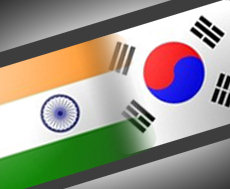India-Korea trade pact to help India-based carmakers
 Seoul - An India-South Korea trade agreement will remove tariff barriers that put India-based South Korean carmarkers at a disadvantage behind their Japanese rivals in the Indian and European markets, South Korean trade observers say.
Seoul - An India-South Korea trade agreement will remove tariff barriers that put India-based South Korean carmarkers at a disadvantage behind their Japanese rivals in the Indian and European markets, South Korean trade observers say.
Indian Commerce Minister Anand Sharma and his Korean counterpart Kim Jong Hoon signed the Comprehensive Economic Partnership Agreement (CEPA) Friday morning in Seoul.
"This agreement will help pick up further momentum in our bilateral trade with India's 1.2-trillion-dollar economy. For South Korea, this is the first deal of its kind with BRIC countries. For India, this is the first deal with OECD countries," said Kim Jong Hoon, South Korea's top trade minister, after signing the agreement with India.
BRIC refers to fast-growing developing economies of Brazil, Russia, India and China, while OECD refers to the Organization for Economic Cooperation and Development, a grouping of developed countries.
The CEPA is similar to a free trade agreement, and includes trade in goods and services and investments, along with chapters on competition and intellectual property rights.
Indian manufacturers of South Korean cars such as Hyundai Motor India (HMI) and GM Daewoo Auto & Technology (GMDAT) will pay less duty on their auto parts imports from South Korea under the agreement, which enables a phased removal of the 12-per-cent tariff over eight years on auto part imports from South Korea.
The tariff benefit is a boon for India-based carmakers who have been troubled with high-cost burdens due to inefficient tax structure and infrastructure bottlenecks.
"Much of the gain from cheap labour (in India) is offset with high material costs. This agreement will help us save material costs. This may help us regain momentum not only for the Indian market but also for HMI exports to Europe," said a trade manager of Hyundai Motor who asked to remain anonymous.
HMI says it produced 489,000 cars in 2008, with at least 10 per cent of the parts imported from South Korea.
Auto parts, which are South Korea's biggest export to India and were worth 1.3 billion dollars last year, are expected to increase by 30 million dollars a year during the next 10 years, thanks to the CEPA.
While Hyundai pays an average 12.5-per-cent tariff on these auto parts imports from South Korea, Japanese carmakers Honda Motor Co and Toyota Motor Corp do not have to pay tariffs for auto parts imports from Thailand because Thailand has an advantageous bilateral trade agreement with India.
Hyundai Motor India managers say this tariff disadvantage has weighed down on HMI's efforts to sell its cars competitively in India and Europe.
Completely assembled cars are excluded from the CEPA pact.
"This means that Indian car makers don't have to worry, because South Korean carmakers won't have any tax benefits when they export finished cars to India from their South Korean factories, even if the CEPA becomes effective as planned in January next year," said a South Korean trade official.
Ironically, India-based carmakers compete with South Korean-based carmakers in their drive into the European car market. Hyundai Motor India exports half of its Indian-assembled cars to Europe.
Hyundai has worried that it may lose in the European car market if a pending trade deal between South Korea and the EU becomes effective. The EU and South Korea said in July that they are close to signing the deal.
Hyundai executives have said that if South Korea-based carmakers enjoy tax benefits without paying a 10-per-cent duty on their car exports to Europe, it would make it hard for Indian-based carmakers who must still pay a 6.5-per-cent duty on their exports to Europe, in the absence of a trade deal with the EU.
Hyundai's i10 and i20 and Maruti Suzuki's A-Star models are all popular in the EU, and get cash incentives for fuel-efficiency in Germany, Spain, Austria, France and Italy. (dpa)